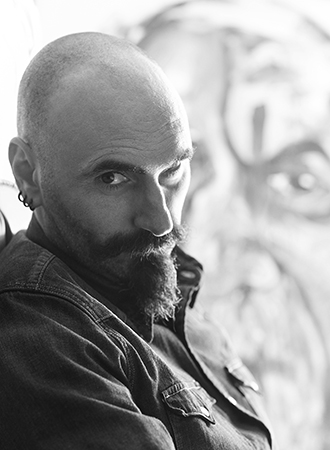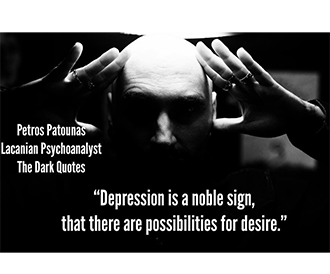‘Ελοΐ Ελοΐ λιμά σαβαχθανί: and yet the Word is not forsaken with the relanguagement of the phallus to which the psychotic subject will inveterate its circumscription to the kinesis of a cause, for, the metric system of a position that has no oscillation and yet it is sexual cannot exist without its binary, mistaken that, that that which cannot be read has been nominated as such, because psychoanalysis has elapsed that those letters having no inscription are not read in the direction of the signifiers, better to murmur doxologized, but, in this displacement’s rhythm, they dimension their form-id-able cry from left to right and in negation to the antithesis of the antonym’s location when it eclipses the linearity of the graph of the signifier’s stasis within the structure∙ and, yes, and that as it has been perceived by the experience of the psychoanalyst’s savoir-faire with the limited devotion to the Organon, which is neither a phallus nor a penis, and who, that he in question, who does not version to recompense the nuisance to inaugurate the proverb’s new truth, once again, one by one, but as the Golden Ass of Apuleius, the asinus aureus that even saint Augustine has been concerned to remark, in his privacy he repeats it, reinventing the signifiers of the wheel: that is the begetting of the position of the supposed subject of idiotic knowledge, surely with the phallus and certainly delicate: it is that which indeed can have the sexual characteristics of time without a phallus∙ and, to this sorrowful conception of a language of a Subject articulating a desire but does not act on it, because the juggler in the king’s temple has avowed that not much can be articulated about desire, even less to act upon it, resulting in an ideal of a speaking subject castrated of its verb afar from the ErgOn, one in the forms of many elevating Rasputin’s fame to that which only the queen knew, to which the Freudian dream would laugh at the false mystery of the statement, that interpretation is dead: for, if the mystery of interpretation has been indemnified, it is because psychoanalysts have been trans-muted into barbarians, foreigners to these new languages and narrative alphabets, for, themselves and their practice is Alien to the real world, with many cured subjects and very few analysts: the letter’s own voice demands that a terrible ear grasp its paradoxical shape, which is flux: this is the Aether allowing to, to he who has no Other to become paranoid∙ on behalf of the issue at hand not been misidentification and neither dis-identification as the body is but a runic transliteration to which desire is dedicated to the altar of the flesh, in perpendicular position but not motion, one to be originated with the blade of the Act for the reason that the knot of a Gordian nature requests to be scarified, when the psychoanalyst can allow his own body to remain on the chair so to introduce the threshold of Λόγος, which is kinesis, perpendicular and not horizontal that is the passage of the signifier: the act in the letter is that which frees those letters and whose sound do not tinkle like feathers the psychoanalyst impressionability because he does not permit to the irony of the voice to shape the activity of the letters, from left to right like numbers, always backwards and chained into the syllabic propositions of the consonant· the Ousia is not an after nor a before, for it is not timed, but harmony equal to the proportion of the modulor and the body inscription of diphthongs, whose union establish that homo-gene-ity which is of the word embodied and from whose faith the signifier is personified: καὶὁ λόγος σὰρξ ἐγένετο: but never the πνεῦμα: that, that which is a letter destined to breath and not to breed the Same, like the signifier.
And he who has a barbarian essence and spells an echo according to the understanding of a structure and not of the diver-a-gency of the alphabet, holding that scepter which is masculine and supposedly further than a given sympathetic meaning, but, a representative of the sybaritic representation of the carnival of the phallus as an antidote to the phenomenology of the gaze, where, or, instead, he who is a diviner of the Logos knows that the apparitions are spelled out by the Voice to this pompe of the signification of the subject of the unconscious, that- and this is what is forgotten because of psychoanalysts’ admiration of the phallus- cannot exist without a Verb: a fecundity sacrament, not of Desiraction and a devouring commemoration of another Tre Ore along the theme of life yet never part of it, reverberating and not verbifying, the trauma of the signifier’s skeleton∙ and, the sibylline depended clauses utter that an object within a cause, that which causes desire, will do better than the phallus, only that the liturgy of Freud’s and Lacan’s signifiers’ as they have been conceived, not through a parthenogenesis but through the sexual position of been or having of the priest, and not of Act and cause, are too much adored from he who still thinks that can have sex with a woman∙ and, because the source, that, that which is inhuman and not bodily, is a circle without a corner to rest, akin to a language and spoken in a parapraxis of desire as a purpose of its speech: and, lo and behold- there, there the Thing tinted lenses its first creation: that which is Lazarus: he who has lived again without the phallus∙ and, in terms of a hypostasis, relating to one Ousia- my dear friend, it is just the configuration of this statement in a different order, for, it is three Ousies and one hypostasis∙ one does not negotiate desire: there are a few letters in the poem put together and produce this famous Act, a signature itself written by your being and that infamous Freudian body∙ for, the inter-cession of the Letter is the principle by which the breath lends a hand and conducts supporters of the Cause who search with a reconciliation with the breath, which is desire: no signifier can mark the body during inhalation.
And if we know how to request kindly a question to en-grave a few words, just to smell the oxygen of an empty space, it would have been related to the Freudian construction in terms of the breath: what is actually been constructed if the practice is beyond the father∙ certainly this construction is not the liturgy of the phallus.

